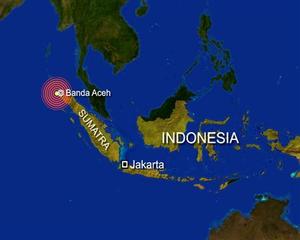
|
| ©REUTERS/Graphics
|
| A map shows the location of an earthquake of magnitude 6.0 which struck off the coast of Indonesia's Sumatra island, near Aceh, the country's meteorological agency said on Friday morning.
|
An earthquake of magnitude 6.0 struck off the coast of Indonesia's Sumatra island, near Aceh, the country's meteorological agency said on Friday, but officials said there was no damage to nearby energy facilities and a tsunami warning was not issued.